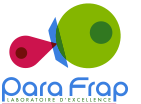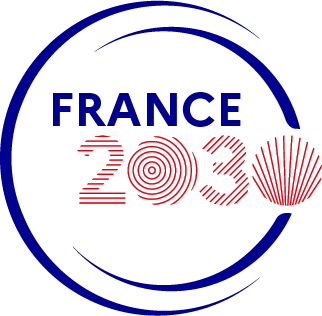

Coordinators: Maryse Lebrun, Derrick Robinson et Olivier Silvie
Participants: Bastien, Hakimi, Langsley, Lebrun, Robinson, Scherf, Silvie, Marion
WP3 will group together experts in parasite cell and molecular biology to address key questions related to gene regulation and differentiation, parasite-specific organelle and cellular functions, and interactions with host cells and tissues. The aim is to identify the principal host and parasite components that contribute to infection and pathogenicity, persistence and immune evasion. Defining these fundamental aspects will provide most relevant clues for prevention and therapy.
1- Gene regulation and differentiation
This WP aims to explore key components regulating gene expression in Toxoplasma, Plasmodium and Leishmania and their infected host cells and to gain insight on non-canonical mechanisms governing gene regulation in protozoan parasites.
Description of work :
The importance of histone modifications has moved epigenetic regulation to the forefront of gene regulation research in Apicomplexa and their infected host cells. Using Toxoplasma and Plasmodium as paradigms, we will characterize, quantify and model the interactions between key epigenetic regulators and chromatin components, upon parasite differentiation, cellular stress and during monoallelic expression of surface variant antigens in P. falciparum (high-throughput ChIP-Chip, ChIP-Seq and mass spectrometry techniques).
Epigenetics mechanism regulating chromosomal DNA replication will be studied using molecular combing in Leishmania. The cis-regulatory elements and trans-acting factors involved in transcriptional and post- transcriptional control of stage conversion will be analyzed in Toxoplasma and Plasmodium (genome-wide analyses, proteomics and genetics). Implementation of innovative global approaches of gene expression will be facilitated by a partnership with the company GenoScreen.
Deliverables :
D1. Comprehensive mapping of histone modification marks and interaction networks of key epigenetic regulators in Toxoplasma (Hakimi/Tomavo)
D2. Identification of parasite determinants of monoallelic expression in P. falciparum (Scherf/GenoSreen)
D3. Identification of transcriptional and post-transcriptional regulators of stage conversion in Toxoplasma and Plasmodium and blood stage development (Tomavo/Silvie/Scherf)
D4. Mapping of chromosomes replication origins in Leishmania and identification of nuclear proteins associated to the centrosomes (Bastien).
2- Parasite organelles and cytoskeleton
To study the function of particular subcellular structures and cellular signals involved in parasite survival, dissemination and pathogenicity. Description of work: Intracellular "atypical" networks of microfilaments and microtubules are essential for motility, survival and pathogenicity of many parasites; we will define the organization and dynamics of versatile actin networks in E. histolytica (high-performance imaging, proteomics and physicochemical analysis).
The flagellum is a complex microtubule-based nanomachine essential for locomotion and the flagellar pocket supports survival by endo/exocytosis in Trypanosomes. Our project will study the biogenesis of the flagellum and of the flagellar pocket (yeast-two hybrid, RNA interference and Nanobodies). We will characterize the role of Phosphoinositides in protein trafficking to specific organelles of Toxoplasma and the role of autophagy in survival and development of T. gondii and Theileria (imaging, genomics, proteomic and functional analysis).
Deliverables :
D1. Characterization of subcellular organization and dynamics of actin filaments in Entamoeba and P. falciparum (Guillen, Scherf)
D2. Identification of parasite factors involved in the biogenesis of the flagellum and associated organelles in Trypanosomes (Robinson/Bastien)
D3. Identification of PIs, effector molecules and other receptors involved in trafficking of proteins and the biogenesis of organelles in Toxoplasma and Plasmodium (Lebrun/Vial/Tomavo)
D4. Identification and functional analysis of autophagosome components in Toxoplasma, Plasmodium and Theileria (Lebrun/Langsley)
3- Host-parasite molecular interactions
To identify essential parasite and host factors, which contribute to successful establishment of parasitic infections and constitute potential targets for therapeutic interventions.
Description of work :
To understand the diverse mechanisms of protozoan motion and its role in the molecular process sustaining invasion of cells and tissues, we will investigate the role of surface parasite proteins during the invasion process of Toxoplasma and Plasmodium (intracellular parasites) with a major goal toward the characterization of the moving junction, a unique structure powered by the parasite to propel itself into the host cell. We will determine the role of surface protein complexes of E. histolytica (extracellular parasite) for parasite-cell contact, tissue penetration and parasite establishment during liver and intestinal invasion. We will characterize the TGF-β signalling network involved in invasiveness of Theileria-infected leukocytes, the TNF pathway in inflammation during intestinal and liver invasion by Entamoeba, and the role of CD81, a host cell surface protein that is required for Plasmodium sporozoite entry into hepatocytes.
Deliverables :
D1. Identification of novel essential parasite factors involved in host cell invasion by Toxoplasma and Plasmodium by genomics and proteomics (Lebrun/Silvie)
D2. Deciphering the physical parameters of parasite motility and the changes due to tissue inflammatory response by imaging in real time the invasion of tissues by Entamoeba (Guillen)
D3. Definition of the TGF-β signalling network associated with leukocyte invasiveness during Theileria infection (Langsley)
D4. Definition of the TNF regulation network during Entamoeba infection (Guillen)
D5. Identification of CD81 molecular partners that contribute to sporozoite host cell invasion (Silvie)
Gordon Research Conference 2026 – Biology of Host–Parasite Interactions The 2026 Gordon Research Conference (GRC) on Biology of Host–Parasite Interactions will take place June 7–12, 2026, at Salve Regina University, in...
The INSERM workshop “Modern methods in molecular parasitology” will take place in Montpellier, France, from 4–6 November 2026. This event will bring together leading experts in...
The 15th CAPF (French Anti-Parasitic and Anti-Fungal Consortium) workshop will take place on 16–17 March 2026 in Strasbourg (France). This event is an excellent opportunity for students and postdoctoral researchers to participate and contribute...
Call for Applications: New Junior Research Groups at Institut Pasteur The Institut Pasteur has launched an international call to recruit new junior group leaders.This is a unique opportunity for high-potential scientists to...
JOB : Ingénieur·e d’étude / Research Engineer – Mosquito Immunity (IBMC, Strasbourg) 🇫🇷 Le laboratoire Mosquito Immune Responses recrute un·e ingénieur·e d’étude à l’IBMC (Strasbourg). La personne recrutée sera en...
Applications are now open for the 2026 Biology of Parasitism (BoP) course, taking place June 12–July 23, 2026 at the Marine Biological Laboratory in Woods Hole, MA.This intensive 6-week program offers PhD students and postdocs advanced training in...
Newcastle University offers a full-time, fixed-term position (3 years) for a Research Assistant or Research Associate in Molecular Parasitology — funded by the Medical Research Council (MRC). About the Opportunity Location:...
Multidisciplinary PhD opportunity in the fields of infectious diseases, gene regulations and molecular signalisation. Fully Funded 4-Year PhD at the University of York A fully funded PhD opportunity is available at the...
The EMBO Workshop 2025 “Host–Parasite Relationship: From Mechanisms to Control Strategies”, took place from October 5–8, 2025, on the beautiful Île des Embiez (France). Organized within the framework of the LabEx ParaFrap and...
Postdoc (M/F) in molecular and biochemical parasitology (Toxoplasma gondii) A 24-month post-doctoral position starting on January 2026 and funded by the French National Research Agency (ANR) is available in the in the...

© 2023. All rights reserved MLCOM
Notre site LabEx ParaFrap utilise des cookies pour réaliser des statistiques de visites, partager des contenus sur les réseaux sociaux et améliorer votre expérience. En refusant les cookies, certains services seront amenés à ne pas fonctionner correctement. Nous conservons votre choix pendant 30 jours. Vous pouvez changer d'avis en cliquant sur le bouton 'Cookies' en bas à gauche de chaque page de notre site. En savoir plus
Ce site utilise des cookies pour assurer son bon fonctionnement et ne peuvent pas être désactivés de nos systèmes. Nous ne les utilisons pas à des fins publicitaires. Si ces cookies sont bloqués, certaines parties du site ne pourront pas fonctionner.
Ce site utilise des cookies de mesure et d’analyse d’audience, tels que Google Analytics et Google Ads, afin d’évaluer et d’améliorer notre site internet.
Ce site utilise des composants tiers, tels que NotAllowedScript699e41869894fReCAPTCHA, Google NotAllowedScript699e418698632Maps, MailChimp ou Calameo, qui peuvent déposer des cookies sur votre machine. Si vous décider de bloquer un composant, le contenu ne s’affichera pas
Des plug-ins de réseaux sociaux et de vidéos, qui exploitent des cookies, sont présents sur ce site web. Ils permettent d’améliorer la convivialité et la promotion du site grâce à différentes interactions sociales.
Ce site web utilise un certain nombre de cookies pour gérer, par exemple, les sessions utilisateurs.

